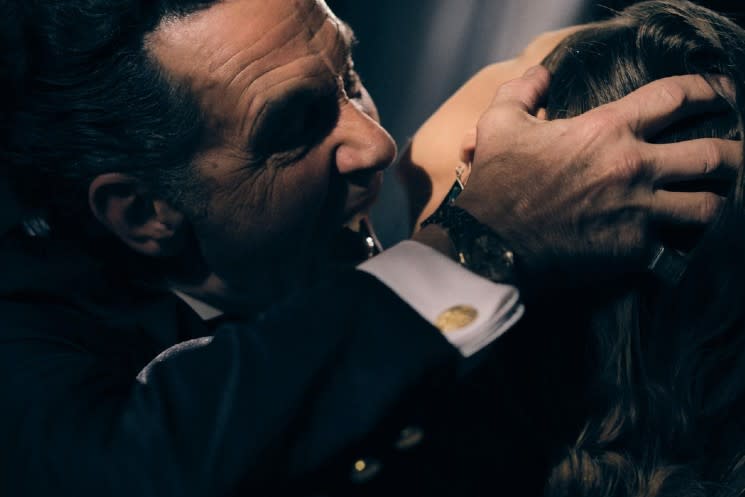Climate of the Hunter finds a chill in the air, inside and outside the cabins in which the movie is set. The title recalls The Night of the Hunter, the 1955 clear and precise portrait of a possessed man. Here, Oklahoma filmmaker Mickey Reece's latest focuses not on an individual but instead on an environment, one hospitable to a moral and potentially supernatural malignancy.
The film opens on a medical report, detailing the various serious psychological ailments of Alma (Ginger Gilmartin). She and her sister Elizabeth (Mary Buss) are shacked up in their shared cabin. Both are middle-aged, Elizabeth showing a noticeable sunglasses tan line along with the 1970s fashions they both sport.
The two come alive when Wesley (Ben Hall) arrives at a nearby cabin. An older man himself, he speaks with experience and a deep voice, sharing winding stories and airy observations. The sisters find him irresistible, even if the draw may not be apparent to anyone not in the room.
Desire doesn't steam off the movie, even if that's a driving motivation for most of the characters in some form or another. They simmer with yearning and hatred towards each other, but empathy towards any of these three, or their children who float through the film,is difficult. Everyone in Climate of the Hunter shares an arch, verbose style; none feel out of place, even if it's tough to connect them to any relatable emotion.
When it comes to why Wesley would be so appealing to the siblings and why he'd have such a ravenous, predatory wandering eye, one logical explanation floats to the top. He's got a taste for flesh in some form or another, a love of the night, and an allergy to garlic. You can draw some kind of conclusion from that.
There's some tweaks on the notion of the vampire provided here, though to the movie's credit that's not its core purpose. "Purpose" is an interesting notion for this set of characters — the two most compelling, Alma and Wesley, are defined by their lethargy and instinctive drive, respectively, forces teased throughout the movie.
When processed through Alma's mind, the situation allows Reece to dig up tricks from B-movie tradition, toying with vampiric imagery in addition to her potentially failing perception of reality. When Wesley prowls, there are moments with him and his scene partner in almost complete shadow, stark slates of darkness over both characters.
The otherworldly playfully pervades beyond Alma's point of view, though. Sudden changers to the reality of the scene are peppered throughout, like the running bit of an offscreen voice announcing each dish seen on screen, piping in to let us know that we're looking at a pear and tuna salad. They're part of the offbeat sensibility setting the story apart from its setting and time.
Through all this, Climate of the Hunter feels like an aesthetic exercise first, effort in storytelling second. The characters sit at a remove from the audience, speaking in unnatural ways, captured in a style that doesn't always feel connected to their actions and intent.
Calgary Underground Film Festival has moved online for its 2020 edition. Buy tickets over at the festival's website.
The film opens on a medical report, detailing the various serious psychological ailments of Alma (Ginger Gilmartin). She and her sister Elizabeth (Mary Buss) are shacked up in their shared cabin. Both are middle-aged, Elizabeth showing a noticeable sunglasses tan line along with the 1970s fashions they both sport.
The two come alive when Wesley (Ben Hall) arrives at a nearby cabin. An older man himself, he speaks with experience and a deep voice, sharing winding stories and airy observations. The sisters find him irresistible, even if the draw may not be apparent to anyone not in the room.
Desire doesn't steam off the movie, even if that's a driving motivation for most of the characters in some form or another. They simmer with yearning and hatred towards each other, but empathy towards any of these three, or their children who float through the film,is difficult. Everyone in Climate of the Hunter shares an arch, verbose style; none feel out of place, even if it's tough to connect them to any relatable emotion.
When it comes to why Wesley would be so appealing to the siblings and why he'd have such a ravenous, predatory wandering eye, one logical explanation floats to the top. He's got a taste for flesh in some form or another, a love of the night, and an allergy to garlic. You can draw some kind of conclusion from that.
There's some tweaks on the notion of the vampire provided here, though to the movie's credit that's not its core purpose. "Purpose" is an interesting notion for this set of characters — the two most compelling, Alma and Wesley, are defined by their lethargy and instinctive drive, respectively, forces teased throughout the movie.
When processed through Alma's mind, the situation allows Reece to dig up tricks from B-movie tradition, toying with vampiric imagery in addition to her potentially failing perception of reality. When Wesley prowls, there are moments with him and his scene partner in almost complete shadow, stark slates of darkness over both characters.
The otherworldly playfully pervades beyond Alma's point of view, though. Sudden changers to the reality of the scene are peppered throughout, like the running bit of an offscreen voice announcing each dish seen on screen, piping in to let us know that we're looking at a pear and tuna salad. They're part of the offbeat sensibility setting the story apart from its setting and time.
Through all this, Climate of the Hunter feels like an aesthetic exercise first, effort in storytelling second. The characters sit at a remove from the audience, speaking in unnatural ways, captured in a style that doesn't always feel connected to their actions and intent.
Calgary Underground Film Festival has moved online for its 2020 edition. Buy tickets over at the festival's website.
